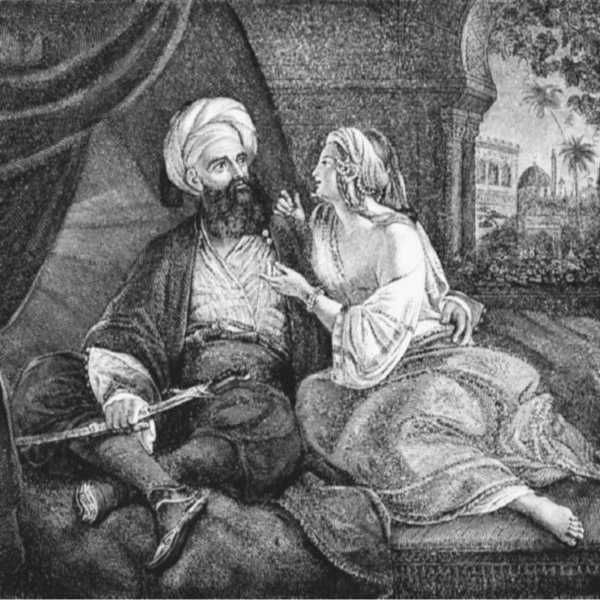... It is related (but God alone is all-knowing, as well as all-wise, and almighty, and all-bountiful), that there was, in ancient times, a
King of the countries of India and China, possessing numerous troops, and guards, and servants, and domestic dependents.... He was called King Shahriyar: his younger brother was named Shah-Zeman, and was King of Samarkand. The administration of their governments was conducted with rectitude, each of them ruling over his subjects with justice during a period of twenty years with the utmost enjoyment and happiness. After this period, the elder King felt a strong desire to see his brother, and ordered his Wezir to repair to him and bring him....
[Having been thus summoned by his brother, Shah-Zeman] ... sent forth his tents and camels and mules and servants and guards, appointed his Wezir to be governor of the country during his absence, and set out towards his brother's dominions. At midnight, however, he remembered that he had left in his palace an article which he should have brought with him; and having returned to the palace to fetch it, he there beheld his wife sleeping in his bed, and attended by a male negro slave, who had fallen asleep by her side.
On beholding this scene, the world became black before his eyes; and he said within himself, If this is the case when I have not departed from the city, what will be the conduct of this vile woman while I am sojourning with my brother? He then drew this sword, and slew them both in the bed: after which he immediately returned, gave orders for departure, and journeyed to his brother's capital.
Rectitude: Rightness or justice.
Wezir (or vizier): A high governmental official.
Repair: Go.
Dominions: Lands.
Sojourning: Staying.
Saluted him: Waved to him.
Abstain: To force oneself not to do something.
Chase: Hunt.
Shahriyar, rejoicing at the tidings of his approach, went forth to meet him, saluted him, and welcomed him with the utmost delight. He then ordered that the city should be decorated on the occasion, and sat down to entertain his brother with cheerful conversation: but the mind of King Shah-Zeman was distracted by reflections upon the conduct of his wife.... His brother observed his altered condition, and, imagining that it was occasioned by his absence from his dominions, abstained from troubling him or asking respecting the cause, until after the lapse of some days.... Shahriyar then said, I wish that thou wouldest go out with me on a hunting excursion; perhaps thy mind might so be diverted. But he declined; and Shahri-yar went alone to the chase.
Now there were some windows in the King's palace commanding a view of his garden; and while his brother was looking out from one of these, a door of the palace was opened, and there came forth from it twenty females and twenty male black slaves; and the King's wife, who was distinguished by extraordinary beauty and elegance, accompanied them to a fountain, where they all disrobed themselves, and sat down together. The King's wife then called out, O Mes'ud! and immediately a black slave came to her, and embraced her; she doing the like....
When his brother returned from his excursion, and they had saluted each other.... [Shah-Zeman] repeated to him all that he had seen. I would see this, said Shahriyar, with my own eye. Then, said Shah-Zeman, give out that thou art going again to the chase, and conceal thyself here with me, and thou shalt witness this conduct, and obtain ocular proof of it.
Shahriyar, upon this, immediately announced that it was his intention to make another excursion. The troops went out of the city with the tents, and the King followed them; and after he had reposed awhile in the camp, he said to his servants, Let no one come in to me. And he disguised himself, and returned to his brother in the palace, and sat in one of the windows overlooking the garden; and when he had been there a short time, the women and their mistress entered the garden with the black slaves, and did as his brother had described, continuing so until the hour of the afternoon-prayer.
... Shahriyar caused his wife to be beheaded, and in like manner the women and black slaves; and thenceforth he made it his regular custom, every time that he took a virgin to his bed, to kill her at the expiration of the night. Thus he continued to do during a period of three years; and the people raised an outcry against him, and fled with their daughters, and there remained not a virgin in the city of a sufficient age for marriage. Such was the case when the King ordered the Wezir to bring him a virgin according to his custom; and the Wezir went forth and searched, and found none; and he went back to his house enraged and vexed, fearing what the King might do to him.
Give out: Spread the word.
Obtain ocular proof: In other words, "see it with your own eyes."
Vexed: Worried.
Now the Wezir had two daughters; the elder of whom was named Shahrazad; and the younger, Dunyzad. The former had read various books of histories, and the lives of preceding kings, and stories of past generations: it is asserted that she had collected together a thousand books of histories, relating to preceding generations and kings, and works of the poets: and she said to her father on this occasion, Why do I see thee thus changed, and oppressed with solicitude and sorrows? It has been said by one of the poets:
Tell him who is oppressed with anxiety, that anxiety will not last: As happiness passeth away, so passeth away anxiety.
When the Wezir heard these words from his daughter, he related to her all that had happened to him with regard to the King:
Shahrazad's life depended on the intriguing tales she told to her husband, King Shahriyar, over the course of a thousand and one nights. Reproduced by permission of the Granger Collection Ltd.

Upon which she said, By Allah, O my father, give me in marriage to this King: either I shall die, and be a ransom for one of the daughters of the Muslims, or I shall live, and be the cause of their deliverance from him. I conjure thee by Allah, exclaimed he, that thou expose not thyself to such peril. But she said, It must be so....
... Now she had given directions to her younger sister saying to her, When I have gone to the King, I will send to request thee to come; and when thou comest to me, and seest a convenient time, do thou say to me, O my sister, relate to me some strange story to beguile our waking hour. And I will relate to thee a story that shall, if it be the will of God, be the means of procuring deliverance.
I conjure thee by Allah: In
Other words, "I command you in God's name."
Beguile our waking hour: In
Other words, "to pass the time."
Her father, the Wezir, then took her to the King, who, when he saw him, was rejoiced, and said, Hast thou brought me what I desired? He answered Yes. When the King, therefore, introduced himself to her, she wept; and he said to her, What aileth thee? She answered, O King, I have a young sister, and I wish to take leave of her. So the King sent to her; and she [Dunyzad] came to her sister, and em-

The Thousand
And One Nights on Film
More than a hundred movies about The Thousand and One Nights, or one of its tales, have been filmed over the years—including a version of Ali Baba released in 1907. One of the most well known ones among modern audiences, of course, is Disney's Aladdin (1992), but that is only one of some fifty movies concerning "Aladdin and the Wonderful Lamp." Half as many more films concern "Sinbad the Sailor," and an equal number focus on "Ali Baba and the Forty Thieves."
A sampling of titles illustrates the wide appeal of The Thousand and One Nights: Ali-Baba und die 40 Rauber (Germany, 1922); Popeye the Sailor Meets Ali Baba's Forty Thieves (United States, 1937); Sinbad contro i sette saraceni (Sinbad Against the Seven Saracens, Italy, 1964); Senya ichiya monogatari (One Thousand and One Arabian Nights, Japan, 1969); Priklyucheniya Ali-Baby i soroka razboynikov (Adventures of Ali Baba and the Forty Thieves, Soviet Union, 1979); and Scooby Doo in Arabian Nights (United States, 1994).
Braced her, and sat near the foot of the bed; and after she had waited for a proper opportunity, she said, By Allah! O my sister, relate to us a story to beguile the waking hour of our night. Most willingly, answered Shahrazad, if this virtuous King permit me. And the King, hearing these words, and being restless, was pleased with the idea of listening to the story; and thus, on the first night of the thousand and one, Shahrazad commenced her recitations.





 World History
World History









